- Home
- JoAnn Ross
Confessions Page 15
Confessions Read online
Page 15
Glancing around, Mariah decided she was the only one who'd seen the pair leave. Putting her glass down onto a marble topped table beside an original Frederic Remington bronze of a bucking bronc, Mariah followed.
Having expected to catch them in a heated, surreptitious embrace, Mariah was surprised to find the senator and his aide engaged in what appeared to be a heated argument. Although she didn't dare open the doors, which precluded her from overhearing their conversation, it was obvious from Alan's rigid stance that he was furious.
For her part, Heather had thrown off her cheerfully efficient attitude and was openly crying. She kept dashing at the moisture on her cheeks with the back of her hands even as she refused to back down from her boss's obvious attempt at intimidation.
Mariah was just considering risking slipping out onto the porch when she heard a familiar voice behind her.
"Mariah, dear."
Biting back a curse, she turned around. As Freddi Palmer touched cheeks, Mariah was smothered in a thick cloud of Obsession. "I am so, so terribly sorry. What a tragedy. What will we all ever do without our darling Laura?"
Tears misted Freddi's doe brown eyes. The Realtor was wearing a black slubby silk Albert Nippon suit that as recently as last week had been on sale at Neiman Marcus for slightly under a thousand dollars. Mariah knew exactly how much the suit cost because she'd gone shopping with Maggie, who'd tried to talk her into trying it on. At the time, Mariah had refused, quipping that she wasn't planning to attend any funerals anytime soon.
The memory of how mistaken her flippant response had turned out to be sent a stiletto right through Mariah's heart.
"I don't know, Freddi." Mariah inwardly swore as she watched a grim-faced Alan slip back into the room. Her opportunity was lost.
"I still can't believe it." Freddi clucked her tongue. "A murder in Whiskey River. I mean, maybe I could accept it if it'd been a couple of cowboys or a jealous husband or boyfriend, the kind of people who hang out at Denims and Diamonds. But Laura? Who on earth would have anything against such a sweet, warmhearted person?"
"That's what the sheriff's going to find out."
"Do you honestly believe he can?" A slim, perfectly arched black brow arched. "I mean, Mariah dear, rumor has it that our sheriff is little more than a burnout victim, come to our fair town to avoid crime, not to solve it. Why, if he wasn't servicing our county attorney, if you know what I mean, I doubt if he would have even been hired."
"He's sleeping with Jessica Ingersoll?" It shouldn't bother her, Mariah told herself. But dammit, it did.
"Of course. Ask anyone in town. It wouldn't be anyone's business, I suppose, except for the fact that a horrible crime has been committed and there's no evidence the sheriff is capable of tracking down the perpetrators. Especially since it's obvious that Laura was killed by outsiders—"
"Why is that obvious?"
"What?" Frown lines etched their way across Freddi's smooth brow.
"I said, why do you think my sister was killed by strangers?"
For what Mariah suspected to be the first time in Fredericka Palmer's life, the woman appeared to be at a total loss for words. "Well, that's what everyone's saying. That she was killed when a burglary went awry, which is more than a little upsetting when you realize how complacent we've all become, believing that crime is reserved for cities like Phoenix or Los Angeles. But Whiskey River?"
"Maybe it was outsiders." Mariah shrugged. "Maybe not."
Freddi gave Mariah a curious look. "Are you telling me you know something different?"
"It just seems like an awfully pat answer."
"Maggie told me that you think Alan killed Laura. And I can certainly see how your vivid imagination would want to embellish what is unfortunately a horribly mundane crime, but I can't believe you're right about this, Mariah."
Mundane? Her sister, Freddi's best friend, was dead and that was the best adjective she could come up with? Mariah was trying to decide exactly how to respond when a stir at the other end of the room captured both women's attention.
"Speak of the devil," Freddi murmured as Trace entered the room.
He was not wearing his hat. Rain sparkled in his black hair. "I'm sorry to disturb your mourning," he said on what Mariah had learned to recognize as his official police voice.
"I presume you've come to tell us that you've put that son of a bitch Garvey behind bars," Matthew said.
Trace had not been able to keep the fact of Laura and Garvey's affair a secret, which hadn't much surprised Trace. Past experience had proven that police departments—no matter how small—tended to leak like a sieve. But it had irritated the hell out of him.
"I haven't completed my investigation yet," he answered. "At this point I'm not prepared to put anyone behind bars."
"So while you're intruding on our grief, my daughter's murderer is running around free?"
In his black western cut suit and lizard skin boots Matthew looked even larger and more formidable than usual. He was wearing a black string bolo tie with a silver and turquoise slide. When she'd first seen him, it had crossed Mariah's mind that her father could have been ordered directly up from a central casting call for nineteenth century rancher barons.
"Why don't we just give Sheriff Callahan an opportunity to tell his story his own way?" Mariah suggested.
"Why don't you just shut your goddamn mouth." Matthew turned on his remaining daughter. "You lost the right to be part of this family ten years ago when you stole your sister's car and went off to live like some two-bit slut in Hollywood."
Trace watched the color drain from Mariah's already too pale complexion. Her shadowed eyes were deep pools of hurt as she stiffened, like a soldier on parade, trying to deflect the pain her father's disapproval could still cause.
It was not the first time Trace had witnessed such behavior from Matthew Swann toward his daughter.
"Mr. Swann," he said. "I am truly sorry for your loss."
"If that's the case—" Matthew began to cut in.
Trace cut him off with a quick swipe of the hand. "I said, I'm sorry," he repeated on a quiet, yet forceful voice. "However, in the event it's slipped your mind, let me point out that my contract with the county supervisors is to keep the peace in Whiskey River. And as it happens, I'm inclined to take my job very literally."
Matthew Swann rose to his full height. "Are you threatening me, Callahan?"
"I'm simply saying that if you continue these attacks on your daughter—" his words were directed at her father, but he was looking straight at Mariah "—I'll be tempted to bring out the rubber hoses."
Struck dumb for one of the few times in his life, Matthew's mouth opened and closed like a grounded trout. It took a good thirty seconds for the rancher to find his voice. "I don't like your attitude, Callahan."
"You're not the first person to say that," Trace said agreeably. "I keep promising to take one of those Dale Carnegie courses, but things keep getting in the way. Like murder investigations," he said pointedly.
Maggie did not miss the brief glance exchanged by Trace and her daughter. Interesting, she thought as she gave the lawman a second, longer study.
"Thank you for coming by, Sheriff," she said, entering into the conversation. Her eyes were slightly glazed and as shadowed as her daughter's. She looked glamorously fragile, like a porcelain statue draped in black. "Would you care for something to drink?"
"Actually, Ms. McKenna, I've come to talk with the senator."
"With me?" Alan arched a patrician brow.
Despite the cane and the faint hospital pallor underlying his tennis court tan, the senator was looking remarkably hale and hearty for a gunshot victim who'd just been widowed, Trace thought Seeing him like this, in his conservative navy suit, starched white pinstripe shirt and Republican red tie, a stranger would never realize mat anything was amiss in Senator Alan Fletcher's privileged world.
"Yes, sir. I have a few more questions."
The senator's helpful, open face closed u
p. "I'm sorry, Sheriff, but I've already told you everything I know about that horrible night."
Which hadn't been much, Trace considered, thinking back on the stacks of mug books he and the senator had looked through together yesterday. None of the faces had looked remotely familiar and Trace had left the hospital room more frustrated than ever. The damn case had bogged down. Over breakfast with Jessica this morning, she'd agreed that it was time to lean on the senator.
The man in the British suit appeared at Alan's right shoulder. "Is my client a suspect, Sheriff?"
"Your client?"
"I'm Peter Worthington." When he extended his hand, Trace noted irrelevantly that the lawyer's nails had been buffed. "Senator Fletcher's attorney." The two men shook hands and studied each other. "Is the senator a suspect?"
"Not at this time," Trace said, not quite truthfully.
There were inconsistencies in Fletcher's story large enough to drive the Suburban through. Beginning with that first lie about his terrific relationship with his wife.
Of course, Trace had allowed, when discussing the case with Jess, anyone who had the unhappy luck to end up in the middle of a homicide investigation couldn't be expected to be open about all the flaws in his seemingly perfect personal life.
Still, the fact that Alan Fletcher spent the hours prior to his wife's murder with his mistress didn't look good.
"Do you have a warrant for my client's arrest?" Worthington asked.
"Not at this time," Trace repeated. The implication that a warrant could be forthcoming lingered in the air between them.
"Then I'm afraid I'm going to have to advise my client not to answer any further questions," the attorney said. "At last count, Senator Fletcher has been interviewed by you on four separate occasions."
"He's given you descriptions—as well as he could—of the intruders, he's given you a timetable of the events of that night, he's not complained when your people literally camped out in his family home, sealing it off as they removed God knows what personal belongings they might consider physical evidence."
Trace heard a speech coming on. The attorney had a deep not unpleasing baritone that probably delivered a crackerjack summation. Having been on the other side of guys like Worthington in a courtroom, forced to watch as dry, boring investigative details were pitted against slick persuasion, superbly honed acting skills and a lot of razzmatazz, Trace was not a fan of defense attorneys. They ranked below politicians, reporters, and used-car salesmen in his personal professions hierarchy.
"It's the senator's wife's murder we're trying to solve, counselor," Trace reminded the attorney.
"Believe me, Sheriff," Worthington countered, "no one is more aware of that unpalatable fact than my client. The past days have been extremely trying for him, both physically—due to his own near critical wound—and emotionally."
"Senator Fletcher has told you everything he knows. He's cooperated enough. I don't believe he should have to keep answering the same questions, over and over again."
He reached into his pocket, pulled out a gold case and extracted an embossed ivory business card and handed it to Trace.
"From now on, if you have anything to discuss with my client, I must ask you to speak with me, first."
Fat lot of good that'll do me, Trace thought blackly. "Fine," he agreed.
All during the brief conversation, Alan Fletcher had remained steadfastly, obediently, silent.
Frustrated and determined not to show it, Trace put his hat back on and left the ranch house, headed back to the office to read through the growing pile of paperwork on the case. It wasn't that he hadn't expected the senator to distance himself from the crime, but he had been hoping that like most politicians, Fletcher would find the glare of the spotlight irresistible and continue to cooperate.
Every instinct Trace possessed, honed from years of police work, told him that the senator was holding something back. Unfortunately, unless he was prepared to arrest Fletcher, which he wasn't, there wasn't any law that could make him answer questions against his will.
Three damn days. And he wasn't any closer to solving the case than he'd been when he'd first arrived on the scene.
Somewhere it was written that it was good for a detective to be smart. Somewhere it was also written that it was better to be lucky.
Trace decided that his luck was long overdue.
"Gotta get better," he told himself. Because things sure as hell couldn't get much worse.
Chapter Eleven
The rain had stopped, leaving the pine-scented air smelling fresh and clean. Trace was halfway to the Suburban when Mariah caught up with him.
"I told you," she said.
"Told me what?"
"That Alan was guilty."
"I didn't realize that had been proved yet." Her hair had been pulled back on the sides by two gold combs and allowed to fall in a long cascade down her back. Trace slipped his hands into his pockets to keep them from diving into those shimmering gilt waves.
"Why else would he need a lawyer?"
"You're the liberal Hollywood screenwriter," he reminded her. "How many times have you written the line about even the good guys needing lawyers to protect their righteous asses against us constitution-hating cops?"
"Only about a million. And one." He thought he saw her lips quirk. "And I believed it every time I wrote it, just as much I believe it now. As much as I believe Alan killed Laura."
"And I also know I'm sounding like a broken record, but I'm going to keep saying it until you listen."
"I'm listening."
She looked up at him. Hard and deep. In her eyes he viewed both skepticism and hope. "Really?"
"Really."
She closed her eyes, briefly, as if issuing up a prayer. "Thank you." Since he didn't know if she was talking to God or to him, Trace didn't respond.
"Nice dress," he said instead. It was silk and clingy and sinfully red. With her bright blond hair she reminded him of a defiant scarlet flame.
Mariah glanced down with a total lack of interest. "It seemed like a good idea at the time. Laura always categorically refused to wear black. She said it was too predictable with her red hair." She sighed. "I was thinking about it this morning and decided it was her one private act of rebellion."
"Everyone's entitled to at least one."
"At least." Mariah had given up counting her own rebellious episodes years ago. She'd thought she'd finally grown up. Until she returned home and found herself falling into old destructive behavioral patterns.
"Anyway, knowing how she felt, and just in case she was somewhere watching, I decided to wear this. Unfortunately, even Maggie disapproved." She ran her hands down the front of the skirt. "And Lord knows she's never been the slightest bit conventional. Dad, of course, hit the roof."
Indeed, for a moment, she'd thought he was going to have a stroke. Mariah's bitter, vulnerable laugh tugged at numerous dangerous chords inside Trace. "Old habits die hard," she said.
Like yanking her father's chain. Having watched how Swann treated his only surviving daughter, Trace couldn't exactly blame her for wanting to get a few hits in herself.
"By the way," Mariah said, "Thanks for sticking up for me in there."
"Sticking up for people is my job."
"To protect and to serve."
"Absolutely."
Mariah had been taking care of herself for so long, it had seemed strange having Trace defend her that way. Strange, but nice, she decided. If she wasn't careful, she could get used to it.
Sighing, she pulled her gaze away from his steady, unreadable eyes and looked westward, in the direction of Clint Garvey's small spread. A brilliant rainbow appeared in the mists, shimmering in a colorful arc over the wild-flower dotted meadows.
"Laura and I learned how to ride in those hills," she murmured. She could almost see them, galloping through the pine trees, racing and laughing. And loving. "When I was young, we used to go out there to get away from our parents' fighting. Later, I j
ust went to get away."
"From your father." From what he'd seen of Swann over the past six months, Trace had come to the conclusion that the man was cold and ruthless, totally without compassion. He was not surprised Maggie McKenna had run away. But to leave her daughters…
"And sometimes from Laura," she admitted.
"It must have been tough," Trace said. "Growing up in the shadow of the favored older sister."
"It wasn't Laura's fault that Dad liked her best. To tell the truth, I didn't help make it any easier. For either of us."
Trace understood how Mariah found causing trouble an attractive way to deal with her private pain and frustrations. He guessed he could probably write a book on such self-destructive behavior, based on his own youthful experiences.
"I was going to make it up to her, dammit," Mariah insisted, more to herself, Trace suspected, than to him. "That was what this trip home was all about." She shook her head. "Thomas Wolfe was right. You can't go home again."
She was tense. Too tense. Trace watched her spine stiffen beneath the scarlet silk and realized she was once again struggling to remain strong.
Not considering that such behavior might be deemed inappropriate under the circumstances, he began massaging her shoulders. "We'll get him. Whoever he is."
There were knots the size of baseballs alongside her neck. He began easing them loose with his fingers.
"Lord, that feels good," she murmured, rolling her head to give him greater access to her tensed up muscles. "I didn't realize they taught massage at the police academy."
"Nursing school." His fingers kneaded the rock hard trapezius muscle. "My ex-wife was an RN. She used to try to work the knots out for me after a killer shift."
"Lucky you."
"Yeah." He didn't mention that in the end, his marriage was responsible for more tensed muscles than his work.

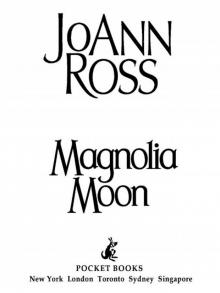 Magnolia Moon
Magnolia Moon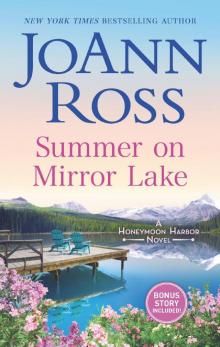 Summer on Mirror Lake
Summer on Mirror Lake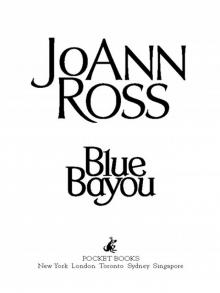 Blue Bayou
Blue Bayou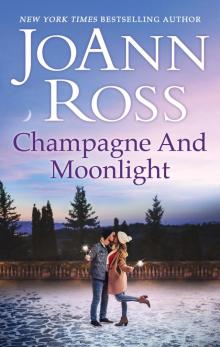 Champagne and Moonlight
Champagne and Moonlight No Regrets
No Regrets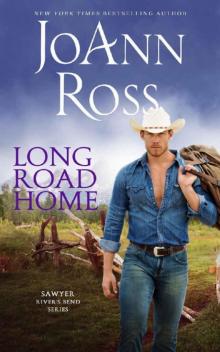 Long Road Home
Long Road Home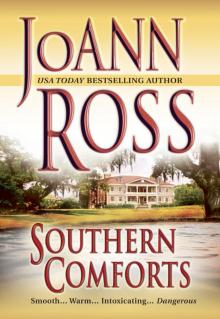 Southern Comforts
Southern Comforts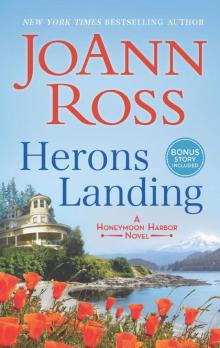 Herons Landing
Herons Landing Untamed
Untamed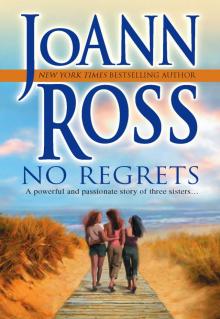 No Regrets (Mira Romance)
No Regrets (Mira Romance)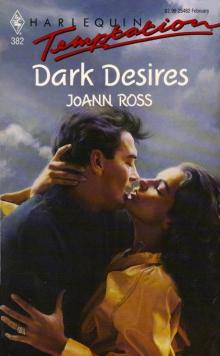 Dark Desires
Dark Desires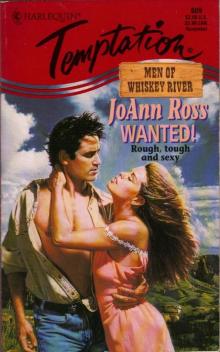 Wanted!
Wanted!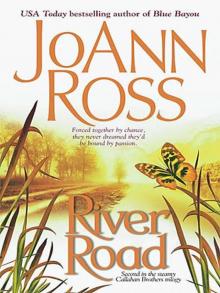 River Road
River Road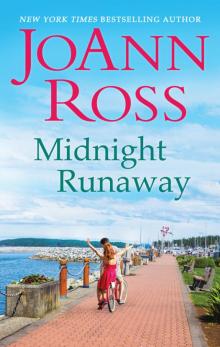 Midnight Runaway
Midnight Runaway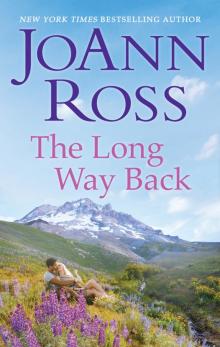 The Long Way Back
The Long Way Back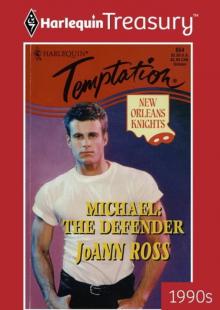 Michael: The Defender
Michael: The Defender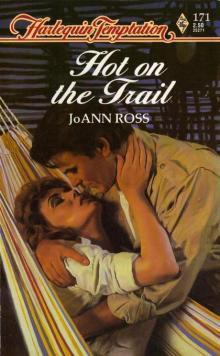 Hot on the Trail
Hot on the Trail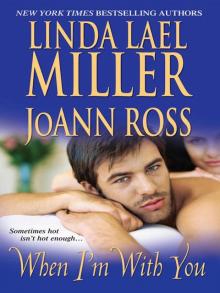 When I'm With You
When I'm With You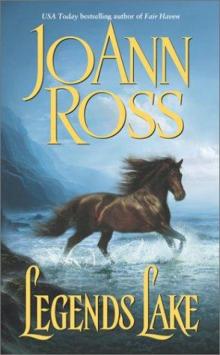 Legends Lake
Legends Lake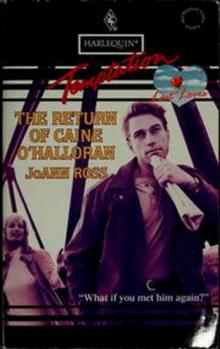 The Return of Caine O'Halloran
The Return of Caine O'Halloran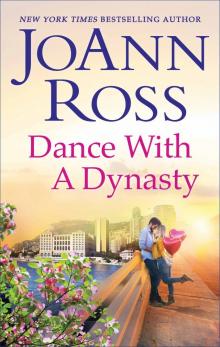 Dance with a Dynasty
Dance with a Dynasty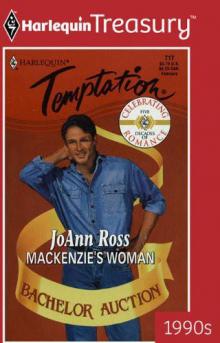 MacKenzie's Woman
MacKenzie's Woman Impulse
Impulse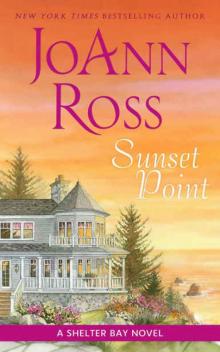 Sunset Point: A Shelter Bay Novel
Sunset Point: A Shelter Bay Novel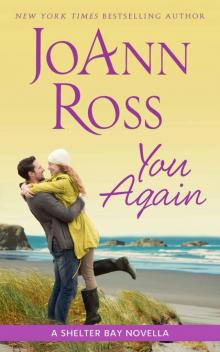 You Again: A Shelter Bay novella (Shelter Bay series Book 8)
You Again: A Shelter Bay novella (Shelter Bay series Book 8)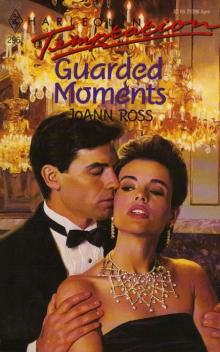 Guarded Moments
Guarded Moments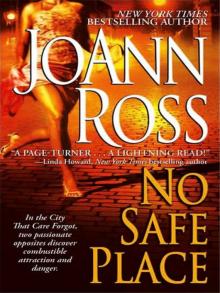 No Safe Place
No Safe Place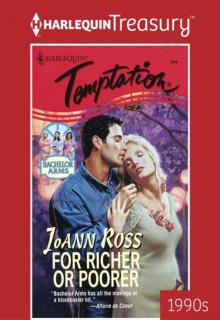 For Richer or Poorer
For Richer or Poorer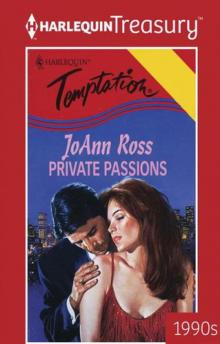 Private Passions
Private Passions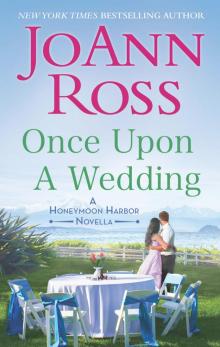 Once Upon a Wedding
Once Upon a Wedding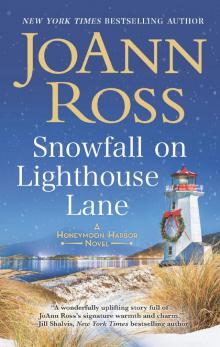 Snowfall on Lighthouse Lane
Snowfall on Lighthouse Lane Christmas on Main Street
Christmas on Main Street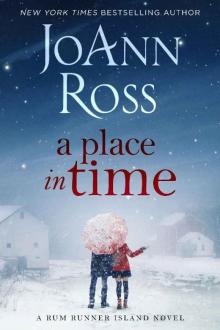 A Place in Time (Rum Runner Island Book 1)
A Place in Time (Rum Runner Island Book 1)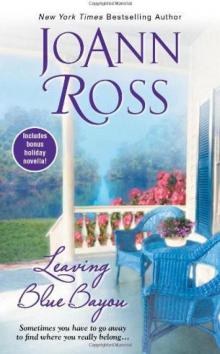 Leaving Blue Bayou
Leaving Blue Bayou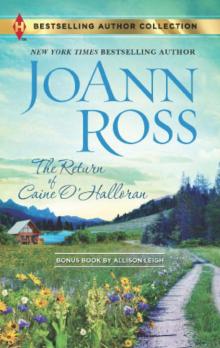 The Return of Caine O'Halloran: Hard Choices
The Return of Caine O'Halloran: Hard Choices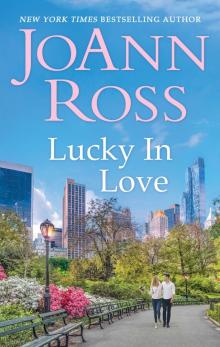 Lucky in Love
Lucky in Love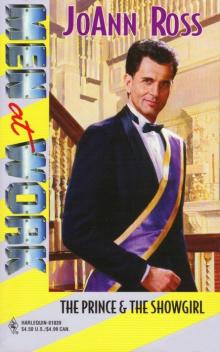 The Prince & The Showgirl
The Prince & The Showgirl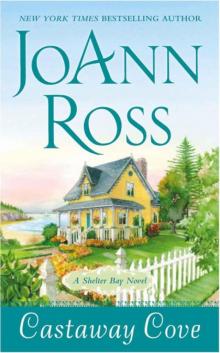 Castaway Cove
Castaway Cove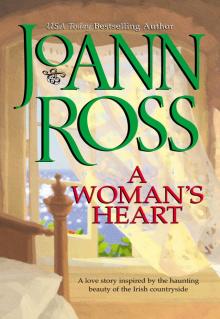 A Woman's Heart
A Woman's Heart One Summer
One Summer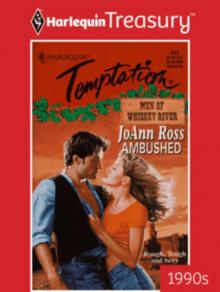 Ambushed
Ambushed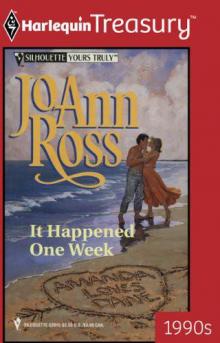 It Happened One Week
It Happened One Week Home by the Sea
Home by the Sea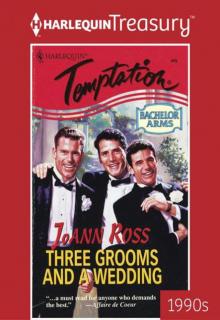 Three Grooms and a Wedding
Three Grooms and a Wedding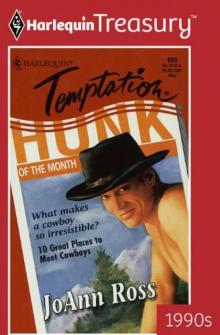 Hunk of the Month
Hunk of the Month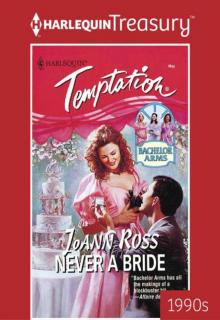 Never a Bride
Never a Bride Sun Kissed
Sun Kissed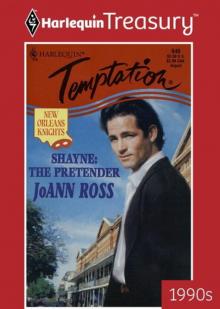 Shayne: The Pretender
Shayne: The Pretender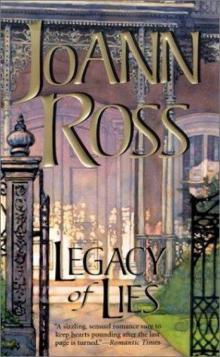 Legacy of Lies
Legacy of Lies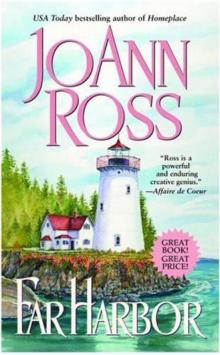 Far Harbor
Far Harbor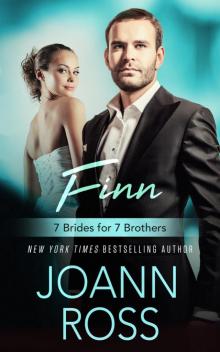 Finn
Finn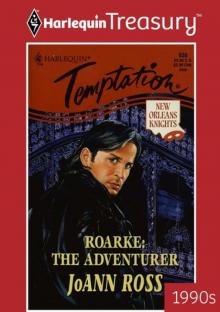 Roarke: The Adventurer
Roarke: The Adventurer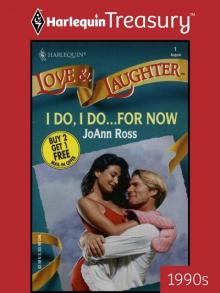 I Do, I Do...For Now (Harlequin Love and Laugher)
I Do, I Do...For Now (Harlequin Love and Laugher) Briarwood Cottage
Briarwood Cottage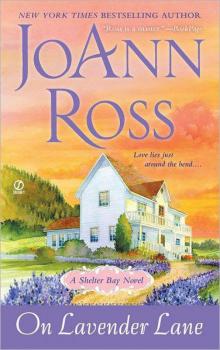 On Lavender Lane
On Lavender Lane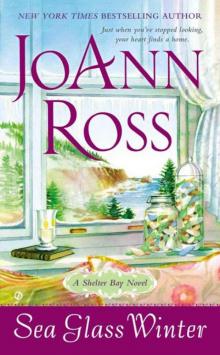 Sea Glass Winter
Sea Glass Winter River's Bend
River's Bend Christmas in Shelter Bay
Christmas in Shelter Bay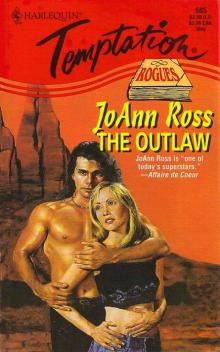 The Outlaw
The Outlaw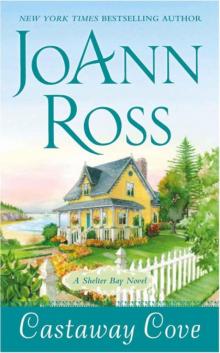 Castaway Cove (2013)
Castaway Cove (2013)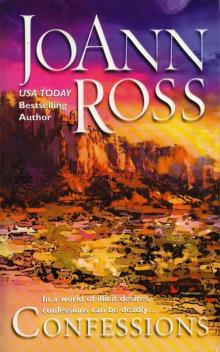 Confessions
Confessions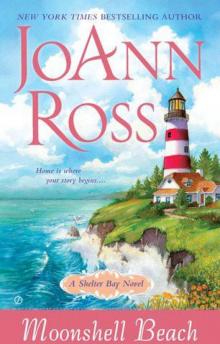 Moonshell Beach: A Shelter Bay Novel
Moonshell Beach: A Shelter Bay Novel